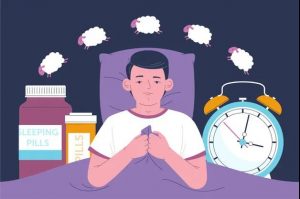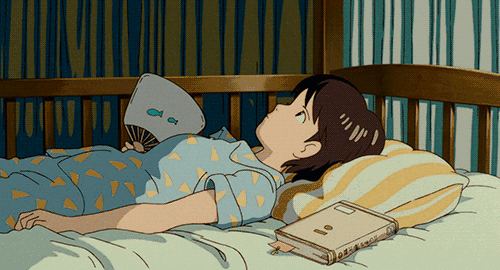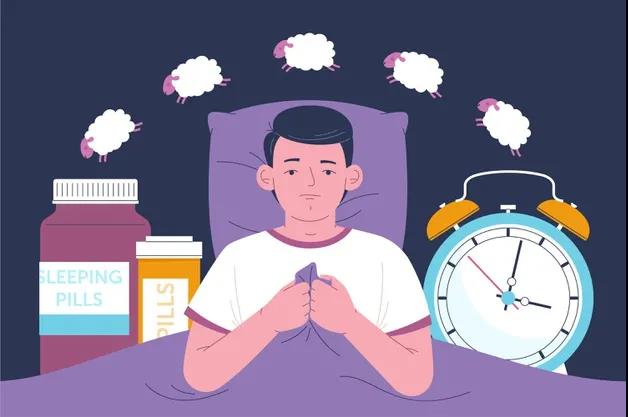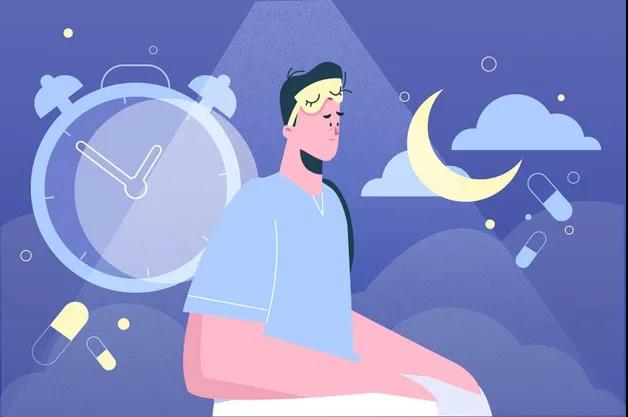
Many people have the habit of listening to music to fall asleep, believing that it helps sleep. But this method does not work for some people, and even interferes with sleep.

Dr. Michael Scarlin, associate professor of psychology and neuroscience at Baylor University and a sleep researcher, found himself waking up in the middle of the night with a song in his head.
He further explored the relationship between listening to music and sleep, and found that listening to music before going to bed might interfere with sleep. The results of this study were published in the authoritative journal Psychological Science.

Listening to music and falling asleep, the quality of sleep is worse
Before understanding this research, let us first come to a term in popular science: earworm effect.
When a song or melody (especially a popular one) is played repeatedly, people will continue to repeat the song (or melody) in their minds as if they have been brainwashed, and even hum unconsciously. This is called “Earworm Effect”.
“Earworm effects” usually occur when awake, but Dr. Michael Scarlin discovered that they can also occur when trying to sleep.
Dr. Scarlin said that the more you listen to music, the more likely it is to attract “earworms” that linger before going to bed. When this happens, your sleep will be affected.

Dr. Michael Scarlin’s research consists of two parts:
199 participants with an average age of 35.9 years completed a series of surveys on sleep quality, music listening habits, and earworm frequency, including how often they encountered earworms when trying to fall asleep, waking up in the middle of the night, and waking up in the morning.
Fifty participants with an average age of 21.2 years were taken into the Sleep Neuroscience and Cognition Laboratory at Baylor University to try to study how “earworms” affect sleep quality.
Before going to bed, the researchers played three popular songs, namely Shake It Off , Call Me Maybe and Don’t Stop Believin.
These participants were then randomly arranged to listen to the original version of the song or the pure music version without the lyrics.
The study found
Participants who experienced the “earworm effect” had more difficulty falling asleep, waking up more at night, and spent longer time in the light sleep phase.
Compared with people who rarely experience “earworm”, people who experience “earworm effect” one or more times a week are six times more likely to have poor sleep quality.
Surprisingly, the study found that some instrumental music (unvoiced) is more likely to cause earworm effects and disrupt sleep quality than lyrical songs.
How to get rid of the “earworm effect”?
For some people, listening to music is more like a sleep triggering mechanism, and familiar sounds are more likely to make people fall asleep.
Dr. Massas Basner, associate professor at the Perelman School of Medicine at the University of Pennsylvania, said, “If you always fall asleep listening to a certain singer’s album, this is also a kind of bedtime ritual, which will help sleep .”

When you try to fall asleep or fall asleep, the content of the sound played is different, and the effect on your sleep is also different.
To prevent the “earworm effect” from interfering with sleep quality, you can try:
People usually fall asleep within 5 minutes to half an hour after lying down, so the music player is set to turn off regularly for 30 minutes, so that we can fall asleep through this ritual without disturbing our sleep state.
Choose more soothing music, because if the tone of the music is ups and downs, you may wake up.
In short, there is some truth in the claim that music helps sleep, but it is not absolutely valid.
Really effective fast sleep method
If you want to fall asleep quickly without insomnia, you need a lot of cooperation. From the time to go to bed, to the light and temperature in the bedroom, to diet and exercise, it will have an impact on sleep. Master of Life recommends 9 ways to make you fall asleep quickly.
Go to bed before 23:00
Our sleep is affected by clock genes and melatonin. The secretion of melatonin starts at night and reaches its peak before going to bed. It is best to go to bed before 23:00.
Keep the bedroom temperature cool
The best room temperature suitable for sleep is 15.6℃~22.2℃. You can install fan air conditioners in the bedroom, or open the windows in the evening to improve indoor air quality.

Play less on mobile phones and computers before going to bed
Reduce the time spent watching the screen of TV, computer, mobile phone, etc.
A study found that blue light emitted by electronic products interferes more with the formation of melatonin than white light. Another study found that the light from a computer screen can also have a similar effect.
Keep the bedroom dark and dull
Darkness in the bedroom is essential for deep sleep, complete relaxation and maintaining the regularity of the biological clock.
Exposure to light before going to bed and during sleep will inhibit the secretion of melatonin, thereby affecting the quality of sleep.
If the window leaks light or you are used to sleeping late, you can install blackout curtains.
Avoid going to bed too full
Avoid drinking alcoholic drinks after 3 pm; avoid being overfull at bedtime, and try to sleep at least 2 to 3 hours after dinner.
Exercise moderately during the day
Appropriate exercise during the day, especially in the afternoon, can relieve the tension of the day and improve the quality of sleep at night.
You can choose jogging, swimming, yoga, etc., while avoiding excessive brain excitement caused by night exercises.
Go to bed after you feel sleepy
Don’t brew sleepiness in bed too early. Some people are used to sitting or lying on the sofa and sleeping while listening to TV. This method is not advisable.
Reduce the daytime rest time
A proper lunch break during the day, but it is best not to exceed 1 hour. Some people who go to bed late often delay their wake up time to compensate for sleep, forming a vicious circle of habitually going to bed late and getting up late.
Choose comfortable bedding
The pillow height, softness and hardness are appropriate, and the thickness of the quilt is appropriate.
Bedding made of sweat-wicking and breathable materials should be used, such as pure cotton, woolen fabrics, silk, bamboo fiber and linen.
Materials such as polyester and synthetic satin can’t get rid of moisture and will get hotter as you sleep. The material of the bedding should feel smooth and comfortable.
Comments